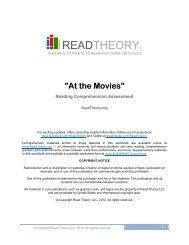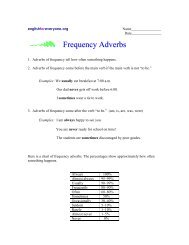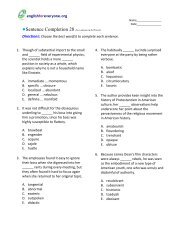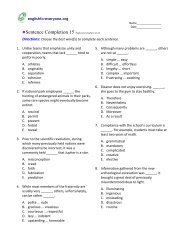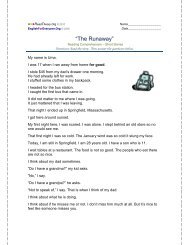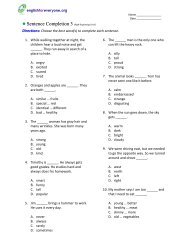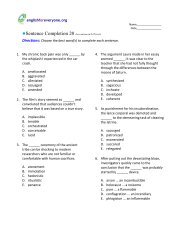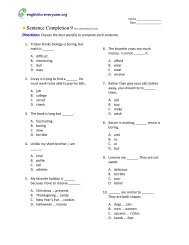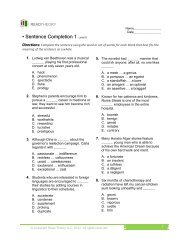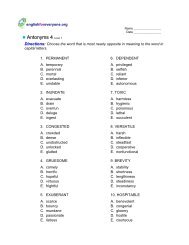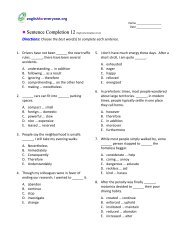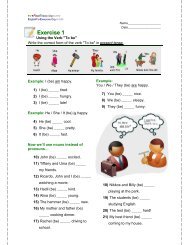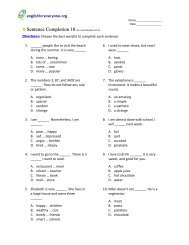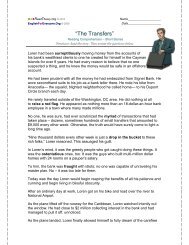“Seeing Through” - English for Everyone
“Seeing Through” - English for Everyone
“Seeing Through” - English for Everyone
Create successful ePaper yourself
Turn your PDF publications into a flip-book with our unique Google optimized e-Paper software.
●●●ReadTheory.Org © 2010 Name________________<br />
<strong>English</strong>For<strong>Everyone</strong>.Org © 2008 Date________________<br />
<strong>“Seeing</strong> <strong>Through”</strong><br />
Reading Comprehension – Short Stories<br />
Directions: Read the story. Then answer the questions below.<br />
Jeffrey brushed quickly past an elderly woman waiting on the plat<strong>for</strong>m ahead of<br />
him to get onto the subway. He wanted to be sure to get a seat to read his New<br />
Economics Journal. As the train screeched out of the station, he lifted his head<br />
from the business news and stared at the man directly across from him.<br />
A fierce wave – a tsunami – of antipathy came over him. Jeffrey knew this man,<br />
knew him all too well. They had become bitter enemies.<br />
Their eyes locked.<br />
As the train reached full speed, the cacophony of speeding wheels against the<br />
winding rails and of the wildly vibrating subway car filled Jeffrey’s ears. To this<br />
frenetic beat, Jeffrey listed in his head all the reasons that this man, whose eyes<br />
he gravely stared into, whose image seemed to appear nearly everywhere he<br />
went, had become anathema to him.<br />
He had climbed the upper echelons of the Wall Street firm using an imperious<br />
manner with his subordinates: issuing directives; ordaining idiosyncratic decrees;<br />
generally making certain everyone knew he was the boss.<br />
Despite his impoverished upbringing, he had become ostentatious. Flush with<br />
cash from the lucrative deals he made on Wall Street, he had purchased a yacht<br />
and a home in Versailles. He used neither. But, oh, how he liked to say he had<br />
them. Meanwhile—Jeffrey knew—this man’s father was on the verge of being<br />
evicted from his decrepit tenement apartment in the South Bronx.<br />
What bothered Jeffrey most about this man was that he never even attempted to<br />
make amends <strong>for</strong> his evil ways.<br />
Could this man change? Jeffrey did not know. But maybe, just maybe, he could<br />
try.<br />
The train screeched to Jeffrey’s stop at Battery Park. He gave the man one last<br />
hard look. “See you around,” he mumbled to himself. And he knew he would—<br />
the wrinkled brow, that part of graying hair, those cold metallic eyes in a subway<br />
window reflection—were his own.<br />
It would take years of hard work and self-contemplation, but Jeffrey would once<br />
again encounter this man on the train, and marvel at what a kinder person he<br />
had become.
Questions:<br />
1) Which best describes Jeffrey's attitude in this passage?<br />
A. anxious<br />
B. studied<br />
C. un<strong>for</strong>tunate<br />
D. self-aware<br />
E. self-pitying<br />
2) A fierce wave – a tsunami – of antipathy came over him.<br />
Given the imagery in this sentence, which word would be the best substitute<br />
<strong>for</strong> came?<br />
A. angled<br />
B. drizzled<br />
C. rained<br />
D. washed<br />
E. trampled<br />
3) As used in paragraph 2, which word<br />
is the best antonym <strong>for</strong> antipathy?<br />
A. ambivalence<br />
B. desperation<br />
C. admiration<br />
D. infatuation<br />
E. happiness<br />
4) Using the story as a guide, it can be<br />
inferred that<br />
A. Jeffrey has few friends<br />
B. Jeffrey likes to be the boss<br />
C. Jeffrey has had a difficult life<br />
D. Jeffrey is capable of change<br />
E. Jeffrey rides the subway<br />
frequently<br />
5) "As the train reached full speed, the cacophony of speeding wheels against<br />
the winding rails and of the wildly vibrating train filled Jeffrey’s ears."<br />
Which literary technique is used in the above sentence (from paragraph 4)?<br />
A. metaphor, a direct comparison between two things which does not use like<br />
or as<br />
B. analogy, an extended comparison showing the similarities between two<br />
things<br />
C. imagery, characterized by appealing to a sense or combination of senses<br />
D. irony, characterized by a contrast or incongruity between what is stated<br />
and what is meant<br />
E. personification, characterized by something being described as if it had<br />
human qualities
Questions (continued):<br />
6) Which of the following best<br />
describes the main conflict in this<br />
passage?<br />
A. man versus man<br />
B. man versus himself<br />
C. man versus society<br />
D. man versus machine<br />
E. man versus nature<br />
8) As used in paragraph 5, to have an<br />
imperious manner means to be:<br />
A. ignorant<br />
B. stoic<br />
C. simpering<br />
D. unaffected<br />
E. domineering<br />
10) What is made clear by the end of story?<br />
7) As used in paragraph 4, anathema<br />
is best defined as a(n):<br />
A. curse<br />
B. vision<br />
C. embarassment<br />
D. antagonist<br />
E. problem<br />
9) As used in paragraph 6, which is the<br />
best synonym <strong>for</strong> ostentatious?<br />
A. assiduous<br />
B. extravagant<br />
C. modest<br />
D. miserly<br />
E. refined<br />
I. The man that Jeffery dislikes is himself.<br />
II. Jeffery was eventually able to become a better person.<br />
III. Jeffery’s father lives in the South Bronx.<br />
A. I only<br />
B. II only<br />
C. I and II<br />
D. II and III<br />
E. I, II, and III<br />
Have you ever had feelings similar to Jeffery’s? Were you able to change?<br />
________________________________________________________________________<br />
________________________________________________________________________<br />
________________________________________________________________________<br />
________________________________________________________________________<br />
________________________________________________________________________
Answers and Explanations<br />
1) D<br />
Self-aware means aware of one’s own emotions and behaviors. In the<br />
passage, Jeffrey realizes that he has become someone he does not like. He<br />
thinks about how this has happened. Near the end of the story, he thinks<br />
about changing. Then we learn that in time Jeffrey becomes “a kinder<br />
person.” Since Jeffrey is thinking about what kind of person he is and how he<br />
became that way, his attitude in the passage is self-aware. There<strong>for</strong>e (D) is<br />
correct.<br />
Anxious means apprehensive or worried about a future matter. Jeffrey is not<br />
concerned with a future matter, so his attitude is not anxious. There<strong>for</strong>e (A) is<br />
incorrect. Studied means well thought out or practiced. Jeffrey is thinking<br />
about his life, but his thoughts do not appear to be practiced, so his attitude is<br />
not studied. There<strong>for</strong>e (B) is incorrect. Un<strong>for</strong>tunate means unsuccessful or<br />
unlucky. Jeffrey may not like himself, but he has been very successful.<br />
There<strong>for</strong>e (C) is incorrect. Self-pitying is feeling sorry <strong>for</strong> oneself. In this story,<br />
Jeffrey seems to truly dislike himself, but he does not feel sorry <strong>for</strong> himself, so<br />
his attitude cannot be described as self-pitying. There<strong>for</strong>e (E) is incorrect.<br />
2) D<br />
A tsunami is an enormous wave. If something has washed over someone, it<br />
has flowed over them. Since the action of a wave can be described as<br />
flowing, washed is a good substitute <strong>for</strong> came in this sentence. There<strong>for</strong>e (D)<br />
is correct.<br />
Angled means bent at an angle or slanted. A giant wave does not approach at<br />
an angle. There<strong>for</strong>e (A) is incorrect. Drizzled means slowly poured down in<br />
small amounts. Since a tsunami is huge and moves over, not down, it is not<br />
slowly poured out. There<strong>for</strong>e (B) is incorrect. Something that rained down<br />
came down more quickly and <strong>for</strong>cefully than something that drizzled, but it still<br />
came down, unlike a wave. There<strong>for</strong>e (C) is incorrect. Trampled means to<br />
have beaten something down by stepping on it. Waves do not have feet to<br />
beat things down. There<strong>for</strong>e (E) is incorrect.<br />
3) C<br />
antipathy (noun): an intense feeling of dislike or disgust.<br />
In paragraph 2, Jeffrey suddenly feels antipathy <strong>for</strong> a man who is his bitter<br />
enemy. Since the man Jeffrey feels antipathy <strong>for</strong> his enemy, someone he<br />
absolutely hates, the reader can infer that antipathy is a strong feeling of<br />
dislike. Admiration is a feeling of esteem, wonder and respect. Since this is<br />
the opposite of intense dislike, admiration is a good antonym <strong>for</strong> antipathy.<br />
There<strong>for</strong>e (C) is correct.<br />
Ambivalence is the coexistence of conflicting feelings. Conflicting feelings are<br />
not the opposite of feelings of dislike, so ambivalence is not an antonym <strong>for</strong><br />
antipathy. There<strong>for</strong>e (A) is incorrect. Desperation is a feeling of near
hopelessness. Feeling hopeless is not the opposite of dislike, so desperation<br />
is not an antonym <strong>for</strong> antipathy. There<strong>for</strong>e (B) is incorrect. Infatuation is a<br />
feeling of exaggerated but short-lived passion. While feeling passionate about<br />
someone is certainly different than disliking them, infatuation is always<br />
temporary. Dislike can be permanent. This means that infatuation is not an<br />
antonym <strong>for</strong> antipathy. There<strong>for</strong>e (D) is incorrect. Happiness is a feeling of<br />
joy. Dislike and joy are different, but not opposite, so happiness is not an<br />
antonym <strong>for</strong> antipathy. There<strong>for</strong>e (E) is incorrect.<br />
4) D<br />
Much of the story is about what a terrible person Jeffrey has become.<br />
However, we learn at the end that he eventually changes into “a kinder<br />
person.” Since Jeffrey was once a selfish person, and then became a kinder<br />
person, he has changed. One must be capable of change in order to change,<br />
so we have evidence that Jeffrey is capable of change. There<strong>for</strong>e (D) is<br />
correct.<br />
While the story does indicate that Jeffrey has become someone who doesn’t<br />
like himself, it does not give the reader any in<strong>for</strong>mation about whether he has<br />
many friends. There<strong>for</strong>e (A) is incorrect. In the middle of the passage, we<br />
learn that Jeffrey “had climbed the upper echelons of the Wall Street firm<br />
using an imperious manner with his subordinates: issuing directives;<br />
ordaining idiosyncratic decrees; generally making certain everyone knew he<br />
was the boss.” This tells us that Jeffrey got to his current position by acting<br />
like the boss, but tells us nothing about whether he liked being the boss.<br />
There<strong>for</strong>e (B) is incorrect. In the middle of the story, we learn that Jeffrey had<br />
an “impoverished upbringing,” but that does not necessarily tell us that his life<br />
was difficult. Since the only other in<strong>for</strong>mation we have about Jeffrey’s life is<br />
that he is wealthy and powerful, the story does not indicate that he has had a<br />
difficult life. There<strong>for</strong>e (C) is incorrect. In the beginning of the story, Jeffrey<br />
boards the subway. At the end of the story, we learn that Jeffrey sees himself<br />
on the train once more years later. This in<strong>for</strong>mation does not allow the reader<br />
to determine how often he rides the subway. There<strong>for</strong>e (E) is incorrect.<br />
5) C<br />
Cacophony is the unpleasantness of a certain sound or sounds. The<br />
sentence appeals to the reader’s sense of hearing by describing in detail the<br />
components of the train that work together to create a loud, unpleasant but<br />
distinctive noise. The sentence uses imagery to create a sensory experience<br />
<strong>for</strong> the reader based on hearing. There<strong>for</strong>e (C) is correct.<br />
6) B<br />
There is no comparison between two things. There<strong>for</strong>e (A) is incorrect. The<br />
sentence does describe several things, but it does so to give the reader a<br />
sense of the sounds they make, not to compare them to each other.<br />
There<strong>for</strong>e (B) is incorrect. There is no incongruity between what is stated and<br />
what is meant. There<strong>for</strong>e (D) is incorrect. The sentence does not describe<br />
any of the objects as if they were human. There<strong>for</strong>e (E) is incorrect.
In the story, Jeffrey sees himself and thinks about the person he has become.<br />
He detests that person, and so detests himself. Near the end of the passage,<br />
he wonders, “Could this man change? Jeffrey did not know. But maybe, just<br />
maybe, he could try.” The reader can infer from this that Jeffrey is not sure if<br />
he can become the kind of person he wants to be. As stated at the end of the<br />
passage, his change “would take years of hard work and self-contemplation.”<br />
What Jeffrey has to overcome here is his own selfishness. In order to change,<br />
Jeffrey has to overcome himself, so the conflict in this passage is man versus<br />
himself. There<strong>for</strong>e (B) is correct.<br />
The story does not provide in<strong>for</strong>mation to support answer choices (A), (C),<br />
(D), and (E). There<strong>for</strong>e they are incorrect.<br />
7) A<br />
anathema (noun): a curse; a person or thing detested.<br />
In paragraph 4, Jeffrey lists the reasons the man he saw across from him<br />
“had become anathema to him.” The story goes on to describe the man’s<br />
poor treatment of subordinates during his ascent in a Wall Street firm and tells<br />
how the man spent money on things just to impress other people. In<br />
paragraph 7, the passage states, “What bothered Jeffrey most about this man<br />
was that he never even attempted to make amends <strong>for</strong> his evil ways.” The<br />
reader can infer from this in<strong>for</strong>mation that anathema is something terrible or<br />
detested—a curse. There<strong>for</strong>e (A) is correct.<br />
A vision is an image produced by the imagination. In paragraph 4, the story<br />
does say that the man’s “image seemed to appear nearly everywhere<br />
[Jeffrey] went.” However, the reasons the man was anathema to Jeffrey are<br />
listed in the next 3 paragraphs. The man is not anathema to Jeffrey because<br />
he is a vision from Jeffrey’s imagination. There<strong>for</strong>e (B) is incorrect. Jeffrey<br />
detests the man he sees, but the man does not appear to be a source of<br />
embarrassment to him. There<strong>for</strong>e (C) is incorrect. An antagonist is someone<br />
who directly opposes another person. Jeffrey hates the man, but it is because<br />
of the life the man leads, not because the man directly opposes him, so the<br />
man is not an antagonist. There<strong>for</strong>e (D) is incorrect. Again, though Jeffrey<br />
hates the man, the man does not do anything that makes the man a problem<br />
<strong>for</strong> Jeffrey. There<strong>for</strong>e (E) is incorrect.<br />
8) E<br />
imperious (adjective): overbearing, arrogant and domineering.<br />
In paragraph 5, the story states, “He had climbed the upper echelons of the<br />
Wall Street firm using an imperious manner with his subordinates: issuing<br />
directives; ordaining idiosyncratic decrees; generally making certain everyone<br />
knew he was the boss.” This means that the man gave orders, created<br />
peculiar rules and did whatever he could to let people know that he was in<br />
charge. The reader can infer from this in<strong>for</strong>mation that someone with an<br />
imperious manner tends to order others around. Someone who orders others<br />
around is domineering. There<strong>for</strong>e (E) is correct.
Someone who is ignorant is unaware. The man was imperious because he<br />
ordered others around, not because he was unaware. There<strong>for</strong>e (A) is<br />
incorrect. Someone who is stoic does not display emotion. The man ordered<br />
everyone around, but we do not know if the man acted without emotion.<br />
There<strong>for</strong>e (B) is incorrect. Someone who is simpering smiles in a silly, selfconscious<br />
way. It is unlikely an arrogant man giving orders with such authority<br />
would smile in a silly way. There<strong>for</strong>e (C) is incorrect. Someone who is<br />
unaffected is genuine. The man’s manner was overbearing, not genuine.<br />
There<strong>for</strong>e (D) is incorrect.<br />
9) B<br />
ostentatious (adjective): a showy display intended to impress others.<br />
In paragraph 6, it says, “Despite his impoverished upbringing, he had become<br />
ostentatious.” We then learn that the man had bought a yacht and home in<br />
Versailles that he liked to tell people about. The reader can infer from this that<br />
the man grew up without any money, then used his later wealth to buy<br />
extravagantly expensive things just <strong>for</strong> show, which means that ostentatious<br />
is a display to impress others. Extravagant means unnecessarily showy or<br />
wasteful, so it is a good synonym <strong>for</strong> ostentatious. There<strong>for</strong>e (B) is correct.<br />
Assiduous means persistent and diligent. Since persistent and showy are not<br />
similar, assiduous is not a synonym <strong>for</strong> ostentatious. There<strong>for</strong>e (A) is<br />
incorrect. Modest means not showy and unpretentious, which is the opposite<br />
of ostentatious, so modest is not a synonym <strong>for</strong> ostentatious. There<strong>for</strong>e (C) is<br />
incorrect. Miserly means lacking generosity, which is different than a showy<br />
display, so miserly is not a synonym <strong>for</strong> ostentatious. There<strong>for</strong>e (D) is<br />
incorrect. Refined means elegant and free from vulgarity. Since being showy<br />
is vulgar, refined is not a synonym <strong>for</strong> ostentatious. There<strong>for</strong>e (E) is incorrect.<br />
10) E<br />
At the beginning of the story, Jeffrey sees a man on the train. Then, in<br />
paragraph 9, it says, “He gave the man one last hard look. ‘See you around,’<br />
he mumbled to himself. And he knew he would—the wrinkled brow, that part<br />
of graying hair, those cold metallic eyes in a subway window reflection—were<br />
his own.” The reader can understand from this in<strong>for</strong>mation that Jeffrey is<br />
looking at his reflection in the subway window and the man he dislikes is<br />
Jeffrey himself. This supports option (I). For much of the story, Jeffrey is<br />
described as a terrible person. In paragraph 8, he wonders if he could<br />
change. In paragraph 10, it says, “It would take years of hard work and selfcontemplation,<br />
but Jeffrey would once again encounter this man on the train,<br />
and marvel at what a kinder person he had become.” We know that the man<br />
on the train is Jeffrey himself. We also know that Jeffrey was an unlikable<br />
man. Since the man has become kinder after years of hard work, we know<br />
that Jeffrey did change to become a better person. This supports option (II).<br />
In paragraph 6, it says that the “man’s father was on the verge of being<br />
evicted from his decrepit tenement apartment in the South Bronx. The reader<br />
can infer that the man’s father lived in the South Bronx. The man is Jeffrey<br />
himself, so the man’s father is Jeffrey’s father, which means Jeffrey’s father<br />
lives in the South Bronx. This supports option (III). There<strong>for</strong>e (E) is correct.



